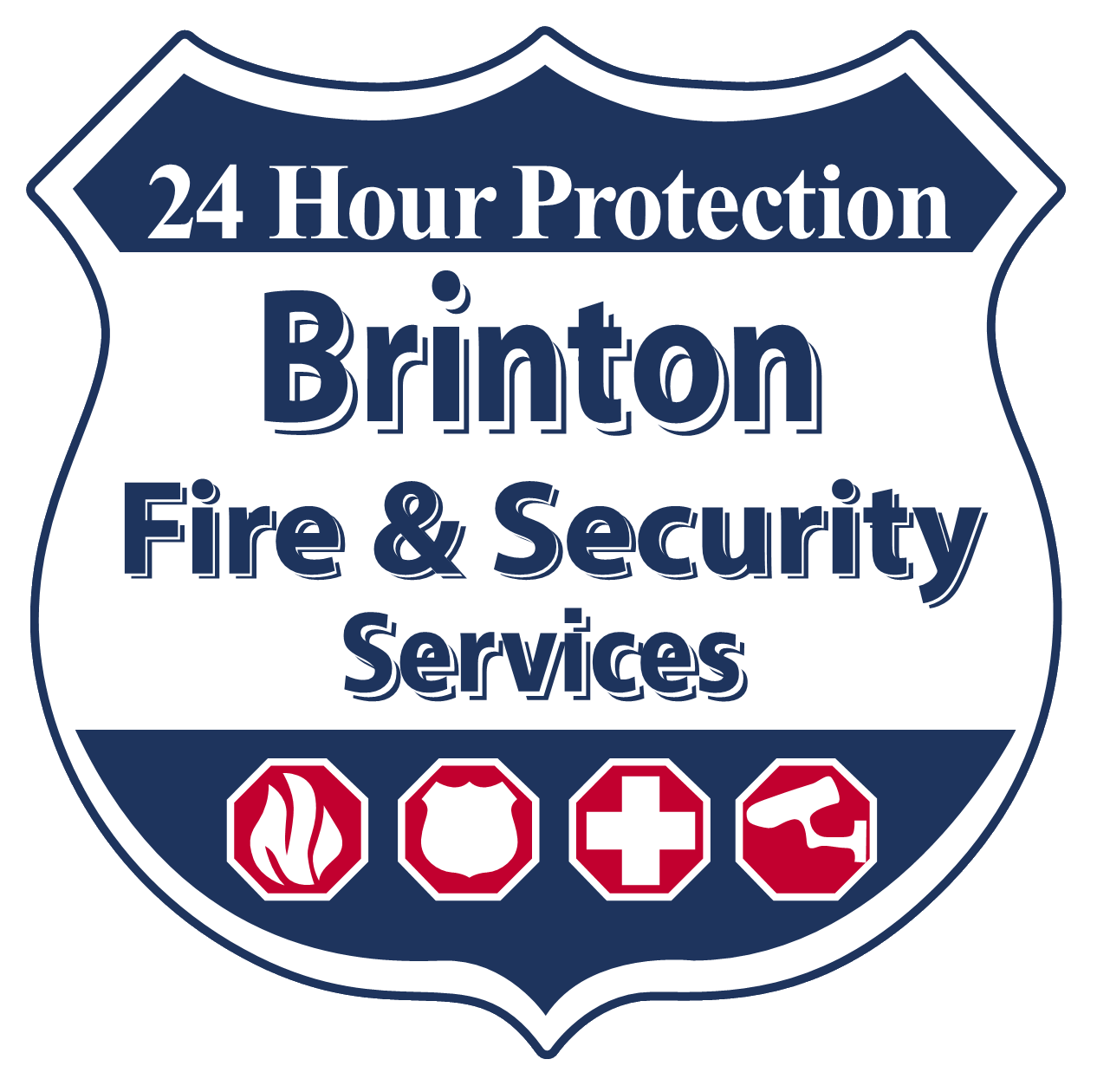Every year, the National Fire Protection Association (NFPA) devotes the third week in October to National Fire Prevention Week. The theme for this year is “Prevent Kitchen Fires,” with fire departments throughout the country holding local community events designed to educate the public on preventing fires in that busy area of the house. Here are some valuable tips they will be sharing:
In recent weeks, the city of Branson, MO, witnessed the closure of several long-term hotels due to code violations. Such incidents highlight the critical importance for businesses to prioritize compliance with safety regulations. At Brinton Fire & Security, we understand the complexities surrounding code adherence, and we’re here to offer guidance to help businesses stay operational and compliant.
The Role of Third-Party Inspections
One of the foundational steps in maintaining code compliance is to conduct thorough inspections. It’s crucial that these inspections are performed by independent third-party contractors like Brinton Fire & Security. These inspections should be documented with a written report detailing the findings. Additionally, an inspection tag must be affixed to the inspected system or device, clearly indicating Year, Month & Date the inspection was performed.
NICET Certified Expertise You Can Trust
At Brinton Fire & Security, we pride ourselves on the expertise and professionalism of our technicians. That’s why our technicians are NICET certified, ensuring that they meet the highest standards in the industry. Our NICET certified technicians bring a wealth of knowledge and experience to every inspection and service call. They are equipped to handle the complexities of fire alarm systems with precision and efficiency. Whether it’s conducting annual inspections, troubleshooting issues, or ensuring compliance with regulatory standards, you can trust our certified technicians to deliver exceptional results every time.
Understanding Inspection Tags
Inspection tags serve as visual indicators of a system’s compliance status. A green tag signifies full functionality and compliance with adopted NFPA standards by the local AHJ (Authority Having Jurisdiction). A yellow tag, on the other hand, suggests some deficiencies or non-compliance issues that need attention, though the system remains operationally ready. Lastly, a red tag indicates impairment and non-operational status, rendering the system out of service and non-compliant with NFPA standards.
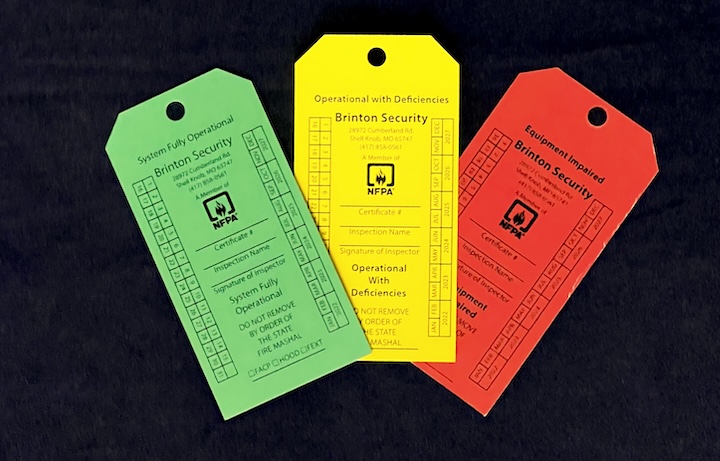
Mandatory Reporting to AHJ
Most municipalities, including Branson, Missouri, mandate that all inspection reports be electronically filed with the AHJ. This ensures that regulatory authorities are kept informed about the status of safety systems within commercial premises.
Key Systems Requiring Inspection
- Commercial Fire Alarm Systems: Annual inspections are imperative to ensure the proper functioning of fire alarm systems.
- Fire Sprinkler Systems: Annual inspections, including backflow prevention devices, are essential to maintain fire suppression capabilities.
- Domestic Water Supply Backflow Preventers: Annual inspections help prevent contamination of the water supply.
- Commercial Hood Suppression Systems: Bi-annual inspections are necessary for establishments like restaurants, school cafeterias, and hospitals to ensure kitchen fire safety.
- Emergency Lighting: Annual inspections of exit signs and path lighting are vital for safe evacuation during emergencies.
- Fire Extinguishers: All types of fire extinguishers must undergo annual inspections to ensure they are in working order.
Consequences of Non-Compliance
Failure to promptly address deficiencies highlighted by yellow tags or ignoring red tag impairments can have severe consequences. These may include the loss of business licenses, financial penalties, or even utility disconnection.
Conclusion
Maintaining code compliance isn’t just about meeting regulatory requirements, it’s about safeguarding lives and property. By choosing Brinton Fire & Security, you’re choosing a team of professionals who are dedicated to maintaining the highest levels of safety and compliance for your business. With our NICET certified technicians on your side, you can have peace of mind knowing that your fire alarm systems ensure a safe environment for employees and patrons alike. Remember, investing in safety today secures the future of your business tomorrow.
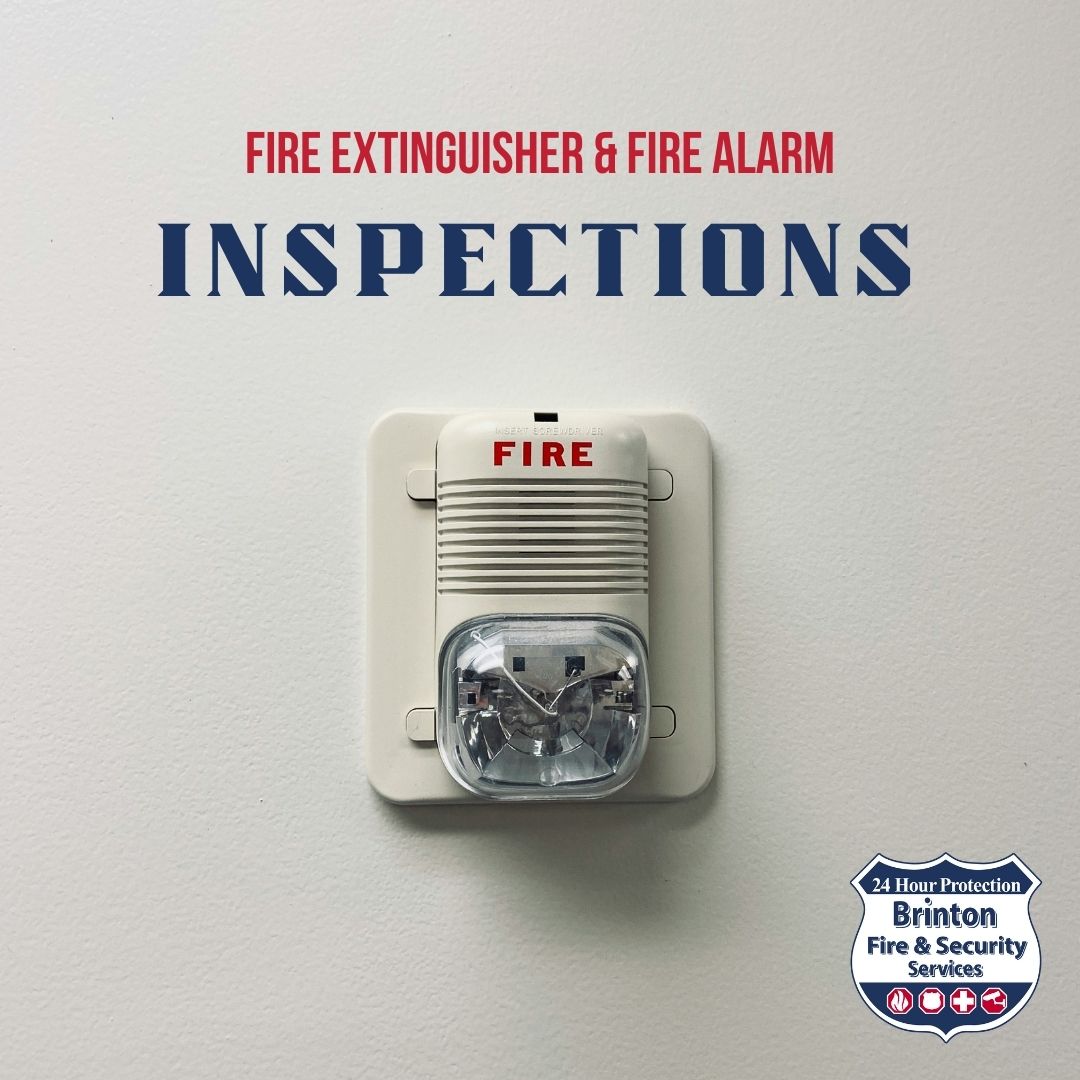
In the dynamic landscape of business operations, prioritizing safety is paramount. Fires pose a significant risk to life and property, underscoring the crucial need for businesses to take proactive measures. At Brinton Fire and Security, we recognize the pivotal role of fire extinguisher and fire alarm inspections in ensuring the safety of your workforce, customers, and assets, specifically serving businesses in Branson, MO. This article sheds light on the importance of these inspections, and reminds us of their mandatory nature for most businesses.
What We Do:
At Brinton Fire and Security, our specialized team conducts thorough fire extinguisher and fire alarm inspections and testing, offering a comprehensive solution to enhance your business’s fire safety measures. These inspections are vital for compliance, ensuring your premises are equipped with functional tools and systems to respond effectively to fire emergencies.
Fire Extinguisher Inspections:
Visual Inspections:
- Our experts perform regular visual inspections, checking for damage, pressure gauge levels, and accessibility to ensure the fire extinguishers are ready for use.
Functional Testing:
- Functional testing involves a meticulous examination of each extinguisher’s operational components. This includes verifying the proper operation of discharge nozzles, ensuring the locking mechanisms function as intended, and confirming the overall functionality of the unit.
Fire Alarm Inspections:
Alarm System Checks:
- Thorough inspections cover sensors, control panels, and communication systems to ensure the fire alarm system functions optimally.
Battery and Power Source Inspection:
- We examine power sources, including batteries, to guarantee uninterrupted operation during power outages.
Verification of Signal Transmission:
- Ensuring the successful transmission of signals to emergency services is crucial for a rapid response to any fire incident.
The Importance and Why We Provide Fire Safety Services for businesses:
Life Safety:
- Fire extinguisher and fire alarm inspections are vital for safeguarding lives during fire emergencies, making early detection and response paramount.
Property Protection:
- Beyond life safety, these inspections protect business assets by minimizing property damage and financial losses through swift response.
Legal Compliance:
- Our services ensure businesses comply with regulations, preventing potential legal consequences associated with neglected fire safety equipment.
Peace of Mind:
- Regular inspections offer peace of mind, assuring businesses that their fire safety equipment is in optimal condition, reducing the risk of unexpected failures during emergencies.
Conclusion:
Brinton Fire and Security is dedicated to assisting businesses in Branson, MO, create a safer working environment through comprehensive fire extinguisher and fire alarm inspections. By prioritizing these inspections, businesses not only adhere to legal requirements but also contribute to the well-being of their employees and the longevity of their operations. Trust Brinton Fire and Security for all your fire safety needs and enhance your business’s safety quotient today.
This month on the Brinton blog, we’re excited to kick off the year by giving you a comprehensive overview of all the services we offer at Brinton Fire & Security. As a business that has grown and evolved over the years, we take pride in meeting the diverse needs of our security and fire clients in Branson, MO and the surrounding areas.
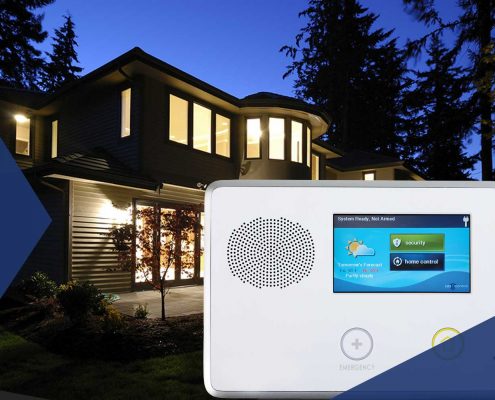
Residential and Commercial Burglar Alarms and Security Systems
At Brinton Fire & Security, safeguarding your property is our top priority. Our residential and commercial burglar alarms and security systems are tailored to meet your specific needs. With 24/7 monitoring, industry-leading technology, and professional installation, we ensure that your property is protected around the clock. Our flexible custom systems are designed to fit your property perfectly, providing you with peace of mind.
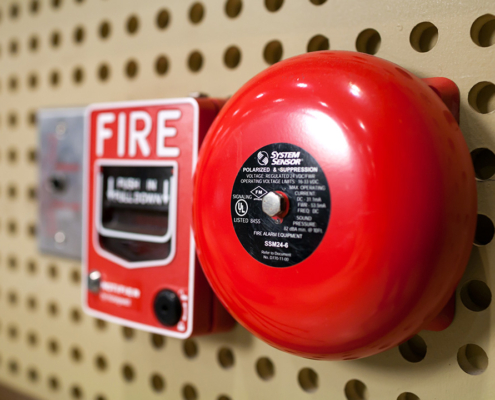
Commercial Fire Solutions
For businesses, fire safety is paramount. We offer a range of commercial fire solutions, including those mandatory fire extinguisher inspections and fire alarm inspections. We also install fire alarm systems. They come equipped with 24/7 monitoring and include essential components like pull stations, smoke detectors, fire extinguishers, and emergency lights. We also provide thorough fire system testing, including fire alarm testing and fire extinguisher testing, to ensure your commercial space is prepared for any emergency.

Camera Systems
From small video doorbells to full-property CCTV systems, Brinton Fire & Security has your home or business covered by video surveillance. Our camera systems include video doorbells, indoor and outdoor cameras, and options for cloud and/or SD card video storage. With live video monitoring and HD recording day or night, you can keep a watchful eye on your property at all times.
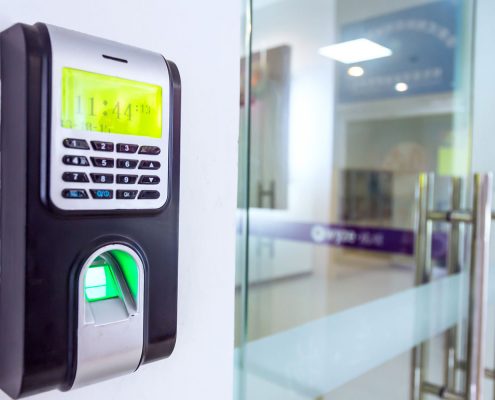
Door Access Control Systems
Take control of who enters your building with our door access control systems. Whether it’s key card systems or code entry, manage access efficiently. Gain insights into building traffic with analytics that track who is coming and going, enhancing the overall security of your premises.

Business Automation and Analytics
For businesses, our automation solutions extend beyond security. With occupancy tracking, people counting, heat mapping, crowd gathering, and queue monitoring, we provide analytics that empower you to make informed decisions about your space. Receive alerts when occupancy is too high and optimize your business operations with our advanced automation features.
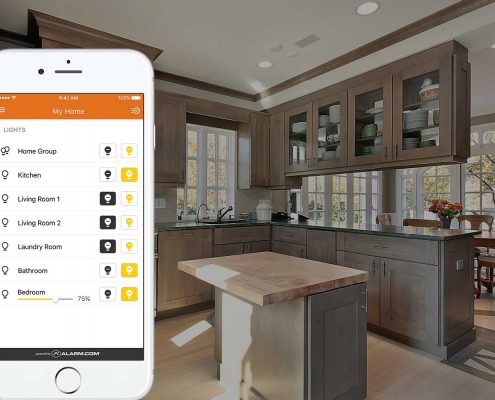
Smart Home Automation
Experience the convenience of smart home automation with Brinton Fire & Security. Control smart lights, thermostats, garage door access, smart deadbolt locks, and intelligent geo-fencing from the palm of your hand. Embrace a connected and secure living environment with our cutting-edge automation solutions.
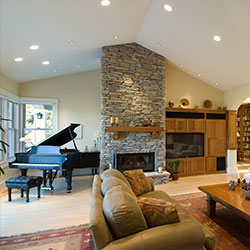
Whole Home Audio
Elevate your home entertainment experience with our whole home audio solutions. From speaker system installations to home intercom systems and home theater setups, we enhance your audiovisual environment with quality and precision.
At Brinton Fire & Security, our commitment is to your safety and peace of mind. With a comprehensive range of services, cutting-edge technology, and professional expertise, we stand as your trusted, local partner in security and fire solutions. Contact us today to explore how we can tailor our offerings to meet your unique needs.
As the holiday season approaches, families and friends come together to celebrate Thanksgiving, a time for gratitude, feasting, and quality time spent in the kitchen. However, it’s important to remember that cooking-related incidents, particularly fires, are more common during this time of year. At Brinton Fire & Security, a trusted security and fire prevention company serving Shell Knob and Branson, Missouri and the surrounding states, we prioritize the safety of our community. In this article, we will provide you with essential fire prevention safety tips to ensure a safe and enjoyable Thanksgiving celebration.
The Increased Risk on Thanksgiving
Thanksgiving sees a significant increase in home cooking fires, with three times as many incidents compared to any other day of the year. The combination of jammed stovetops, crowded kitchens, and additional cooking activities can lead to accidents if precautions are not taken. To avoid potential disasters and keep your loved ones safe, it’s crucial to follow these fire prevention safety tips:
1. Keep a Watchful Eye
One of the most important fire prevention tips is to never leave your cooking unattended. If you need to step away from the kitchen, ensure that you turn off the burner. It only takes a few seconds for a fire to start and spread, so always stand by your pan.
2. Be Mindful of Frying
Frying food is a common cause of cooking fires. When frying, it’s essential to keep an eye on what you’re cooking. If you notice smoke or grease starting to boil, turn off the burner immediately. Additionally, remember to roll up your sleeves to reduce the risk of your clothing catching fire.
3. Supervise Children and Pets
Children and pets are naturally curious and might be drawn to the kitchen during Thanksgiving festivities. To prevent accidents, ensure they stay away from the stove and other cooking appliances. Keep a close eye on them and assign a responsible adult to supervise their activities.
4. Stay Alert and Monitor Your Cooking
While preparing a feast, it’s easy to become distracted by the buzz of family and friends. However, staying alert and focused on your cooking is crucial for fire prevention. If you notice any signs of smoke or if grease starts to boil, turn off the burner immediately.
5. Handling an Oven Fire
In the event of an oven fire, it’s important to stay calm and take immediate action. Keep the oven door closed and turn off the heat to suffocate the flames. Do not open the door until the oven has cooled down completely.

Creating a Safe Cooking Environment
Safety Tips for a Safe Thanksgiving
Apart from being vigilant while cooking, it’s essential to create a safe environment in your kitchen. By following these additional fire prevention tips, you can minimize the risk of accidents:
6. Clear the Area
Ensure that any flammable items, such as dishtowels, bags, boxes, paper, and curtains, are moved away from the stove. Keeping these items at a safe distance reduces the risk of them catching fire.
7. Handle Pot Handles with Care
To prevent accidents, always turn pot handles towards the back of the stove. This ensures that no one accidentally bumps into or pulls them over, reducing the risk of spills or burns.
8. Outdoor Use of Turkey Fryers
If you plan to use a turkey fryer, it is crucial to do so outdoors and on a sturdy, fire-resistant surface. Keep the fryer away from anything that can catch fire, and make sure you follow the manufacturer’s guidelines for safe usage.
9. Check Smoke Alarms
Regularly check and ensure that your smoke alarms are in working order. Install smoke alarms near sleeping areas to provide early warning in case of a fire. It is important to have an escape plan that your family is familiar with in case of an emergency.
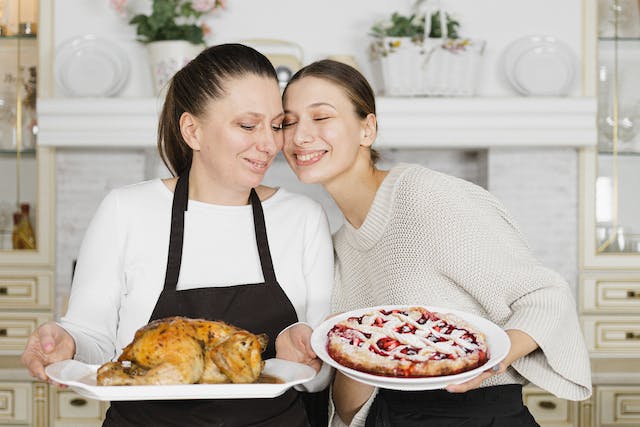
Safe Turkey Frying
Turkey day Fire Prevention Safety
Deep-fried turkey has become a popular Thanksgiving tradition, but it comes with its own set of fire hazards. If you plan to use a turkey fryer, follow these safety tips to prevent accidents:
10. Choose the Right Location
Turkey fryers should always be used outdoors, away from any flammable structures or materials. Never use them in garages, on covered patios, or near wooden decks.
11. Thaw the Turkey Completely
Ensure that the turkey is completely thawed before frying it. A partially frozen turkey can cause the hot oil to splatter, leading to potential burns and fires.
12. Don’t Overfill the Fryer
Overfilling the fryer with oil is a common mistake that can lead to dangerous situations. Follow the manufacturer’s instructions and never exceed the recommended oil level. Before adding the turkey, perform a water test to determine the correct amount of oil.
13. Never Leave the Fryer Unattended
It is crucial to stay present and attentive while operating a turkey fryer. Never leave it unattended, and keep children and pets at a safe distance. Remember that the oil will remain dangerously hot for several hours after use.
14. Use the Recommended Oil
Always use the type of oil recommended by the manufacturer for your turkey fryer. Different oils have different ignition temperatures, and using the wrong oil can increase the risk of a fire.
15. Keep an All-Purpose Fire Extinguisher Nearby
Having a functioning fire extinguisher within reach is essential in case of emergencies. Ensure that you know how to operate it effectively. Remember, never use water to extinguish a grease fire.

Conclusion
Thanksgiving is a time to cherish and celebrate with loved ones. By following the fire prevention safety tips provided in this article, you can ensure a safe and enjoyable holiday season. Remember to stay vigilant, create a safe cooking environment, and take necessary precautions when using turkey fryers. At Brinton Fire & Security, your safety is our top priority. If you require any assistance with fire prevention or security systems, don’t hesitate to reach out to us. Wishing you a happy and fire-safe Thanksgiving!
For more information about fire safety, please visit the U.S. Fire Administration’s site. For readiness tips, visit Ready.gov.
The holidays are a busy time and most people are scrambling to do too much, too fast. Unfortunately, all of that busy work and rushing from store-to-store trying to finish up last minute shopping means many homeowners may be neglecting basic safety at home. Whether you are cooking holiday meals or just putting up your Christmas lights, it is important to keep fire safety in mind.
Tips for Keeping Your Home Safe
From candles being lit to baking your Christmas ham, the holidays involve the risk of fire in your home. Keep your home safe by taking the time to prepare and implement a few additional safety tips this holiday season:
- Kitchen Safety – If you are cooking (whether it is on the stove or in the oven), stay in the kitchen as much as possible. If for some reason you need to step away, return to the kitchen frequently to check on boiling pots, simmering sauces and anything baking in the oven.
- Candle Safety – Keep flaming candles away from children and never leave children alone in a room with a lit candle. LED candles are a good choice. They flicker and look just like real candles, but without the flame. Do not use candles near flammable materials, such as curtains or a Christmas tree.
- Keep a Fire Extinguisher Handy – Every home should have a fire extinguisher. These are relatively inexpensive and can be stored in the laundry area or kitchen to stop any minor house fires from becoming devastating ones.
- Test Smoke Alarms – Smoke alarms should be tested just before the holidays and every month after that. Replace batteries in all of your carbon monoxide detectors as well.
- Be Safe with Christmas Lights – If you are setting up Christmas lights outside, keep plugs away from standing water, snow or any other type of moisture. Do not use extension cords that are frayed. Indoors, only use grounded outlets and keep your Christmas tree lights on a timer so that they do not remain on overnight.
About Brinton Security
To learn more about how you can protect your home from fires this holiday or to install a fire alarm with your home alarm system, contact your local home security specialists. Brinton Security offers free consultations and can help you install a system that protects your home during the busy holiday season and right through the year.
Give us a call today!
When you purchased those smoke detectors you so responsibly installed in your home, did you notice a similar-looking detector for carbon monoxide? If you have any products or equipment in or near your home that burn fuel, you might want to pick up a few carbon monoxide detectors too.
Unlike smoke or natural gas, carbon monoxide is colorless and odorless, but it is just as poisonous. In the U.S., between 150 and 200 people die annually from carbon monoxide (CO) poisoning produced by malfunctioning furnaces, ranges, water heaters, space heaters, fireplaces, charcoal- or gas-fired grills and engine-powered devices such as portable generators.
Even more lose their lives when CO accumulates after people leave their cars running in garages. And every year, thousands of people wind up in emergency rooms for treatment as a result of CO poisoning.
Prevention involves following these basic safety procedures.
- Install all appliances following the manufacturer’s instructions as well as local building codes – generally by qualified professionals.
- Unless you have the proper knowledge and skill as well as the appropriate tools, do not service fuel-burning appliances yourself.
- If your home has a fuel-burning heating system, have it serviced and inspected annually by professionals. Be sure to include chimneys and flues.
- Operating a portable generator or another gas-powered tool in or near an enclosed space can trap CO, leading to potentially lethal levels of the gas. Open doors and windows do not provide enough ventilation.
- Never use camping stoves designed for outdoor use only in an enclosed vehicle, tent or building. Some of these products may be designed to work in enclosed spaces, but they will specify that on the packaging and provide instructions for their safe use.
- Never burn charcoal in any kind of enclosed space such as a building, tent, or vehicle.
- Never leave a car running in a garage, even if you have the door open.
- Don’t use gas appliances such as ovens or clothes dryers as space heaters for your home.
- If you use a natural gas or propane oven, don’t cover the bottom with aluminum foil the way you can with an electric oven. You can block the oven’s combustion flow, producing CO.
- Re-check all gas appliance vents, heating vents or chimney flues after any home renovations. These can easily be blocked by forgotten tarps or debris.
- Install carbon monoxide alarms in hallways near every sleeping area and in living areas in the neighborhood of fuel-burning appliances. The recommendation is one alarm installed in the hallway outside every bedroom. Make sure the alarms aren’t blocked by furniture or window coverings. CO alarms should not be installed in kitchens or directly above any fuel-burning appliances. Test alarms regularly and replace following the schedule recommended by the manufacturer.
Signs and Symptoms of CO Poisoning
Initially, CO exposure has symptoms that resemble the flu without any fever. These include headaches, shortness of breath, nausea, dizziness, and fatigue. Further exposure can lead to vomiting, mental confusion and loss of muscular coordination. The end result is loss of consciousness and finally, death. The exposure levels and duration can affect the severity of the symptoms.
If you find yourself experiencing any of these symptoms unexpectedly, don’t wait for the CO alarm to go off to confirm it. Leave your home immediately and call the fire department on your cell or at a neighbor’s home. If they find evidence of high levels of CO, be sure that you and any family members who were exposed see a doctor immediately, letting him or her know about the CO exposure.
The Best Way To Avoid Carbon Monoxide Poisoning
Finally, have all of your appliances checked for problems before re-using them. If one or more CO alarms go off in your home, leave immediately with all family members and pets. Call 911 and do not re-enter your home until the emergency specialists have ensured you that it is safe. Even a few minutes can lead to loss of consciousness and death if the exposure is high enough. Do not use the problem equipment again until a qualified service technician checks and repairs it.
We Can Help – Contact Us Today.
Carbon monoxide poisoning is an easily avoidable risk, yet every year too many people succumb to it. Like wearing a seatbelt, you may never need a CO detector, but why take a chance? By following these few simple steps, AND installing a carbon monoxide detector by a qualified professional security company, you may become a lifesaver for the ones you care about most.
Although children look forward to tricks, treats, and ghoulish garb, Halloween can be fraught with fright for parents, with candy given to their kids by strangers and a legion of masked and costumed trick-or-treaters at the door. However, following a few safety tips can ensure safe fun for kids and candy-givers alike.
The activities below focus on Halloween, which is celebrated in the last week of October. The efforts throughout the month generate enthusiasm for crime prevention so it can grow stronger and become more widespread.
To ensure that trick-or-treaters, you, and your house stay safe, remember the following tips.
- Clear your yard and sidewalk of any obstacles or decorations that may be hard to see in the dark, lest someone go bump in the night.
- Keep your house well lighted, both inside and out; you wouldn’t want to miss any particularly good costumes, would you?
- Ask your Neighborhood Watch or local citizen’s group to haunt (patrol) your community.
- Report any suspicious or criminal activity to your police or sheriff’s department.
To make sure even the scariest costumes are safe, keep the following in mind when buying or designing one.
- Try makeup instead of masks; it’s more comfortable and doesn’t obstruct vision the way masks can.
- Check to ensure that costumes are flame-retardant so that young ones are safe around jack-o’-lanterns, candles, and other flames.
- Keep costumes short to ensure that the only trip taken is the one around the neighborhood.
- Look for brightly colored costumes, attach reflector strips to costumes and bags, and remind trick-or-treaters to carry glow sticks and flashlights.
- If a costume involves any sort of fake weapon, make sure that it is made of a flexible material such as cardboard or foam. Or, avoid the whole problem of weapons by challenging your child to design a costume that is scary without one.
Keep in mind the next few tips to make sure your trick-or-treater’s night in the neighborhood will be safe and fun.
- Older kids should trick-or-treat in groups; kids walking around alone are never as safe as those in groups, and especially not at night. Younger kids should be accompanied by a parent or trusted neighbor.
- Review the route for trick-or-treating beforehand and set a time set when kids should be home. Also, have a plan if your child gets separated from his or her friends or from you.
- Remind your children not to enter strange houses or cars.
After a successful and safe night around the neighborhood, remember that the treats still need scrutiny before anyone eats them.
- Remind your children not to eat treats until they’ve come home. To help ensure this, feed them a meal or a substantial snack before they go out.
- Check all treats at home in a well-lighted place. Be especially wary of anything that is not wrapped by the factory or that is no longer sealed.
- Remind kids not to eat everything at once, lest they be green even without the makeup.
About Brinton Security
Founded in 2001, Brinton Security Services has been dedicated to providing protection for both residential and commercial settings. Although specializing in home security, we also install/service/monitor fire, gate, camera, and personal emergency response systems as well as whole house audio, home theater, home automation, and phone systems. We are proud to serve Missouri, Arkansas, Oklahoma, and Kansas. Our aim is to “Protect What Matters!”
- Stay in the kitchen when you’re cooking on the stovetop. If you are frying, grilling, broiling or boiling food, you must be in the room to make sure your food doesn’t burn. The safety concern is not only for burned food, but for smoke in the air and the pan catching fire.
- Stay in the home when you’re cooking in the oven. If you are baking, roasting or braising food in the oven, you don’t necessarily need to be in the kitchen, but you do need to be in the home – and you definitely need to use a timer to prevent any fire risks.
- Keep your smoke alarm on while cooking. Some people are tempted to remove their smoke alarm batteries when cooking certain dishes. But whether you are baking cookies or frying up bacon, your smoke alarm should stay on. Disabling it could put your family at risk of harmful smoke inhalation.
- Keep your kids and pets safe while cooking. Young children have been known to burn themselves on front burner pots and pans. Teaching them not to touch is good, but putting things on the back burner to remove the risk is better. Pets should also be kept at least three feet from the stove.
- Keep flammable items away from the stove. Avoid cooking with loose-fitting sleeves. Hanging sleeves can easily catch fire. As for necessary items like potholders and kitchen towels, they should be safely to the side on the counter – not the stove.
These are just some of the tips that fire departments want citizens to know when it comes to preventing kitchen fires. If there is a National Fire Prevention Week event going on in your community, we encourage you to attend. Search #NationalFirePreventionWeek on Twitter to find an event near you!
ABOUT BRINTON SECURITY
Founded in 2001, Brinton Security Services has been dedicated to providing protection for both residential and commercial settings. Although specializing in home security, we also install/service/monitor fire, gate, camera, and personal emergency response systems as well as whole house audio, home theater, home automation, and phone systems. We are proud to serve Missouri, Arkansas, Oklahoma, and Kansas. Our aim is to “Protect What Matters!”
With over a million views on Youtube, videos on the 6-second garage door break-in cause more than a little concern. The videos show how thieves can break in through a commonly used automatic garage door in 6 short seconds, using nothing more than a wire hanger.

Garage entrance is not just common; it is one of the criminal’s favorite ways to gain entrance into a home. Why? Someone entering a garage does not throw up the same red flags as someone breaking glass or climbing through a window. Not only do most people overlook a stranger near a garage, once the door is open, the thief quickly slips in, closes the door, and breaks into the home (or prepares to steal from the garage itself) while under complete cover.
Here are some important ways you can secure your garage:
- Replace your garage opening system to a modern “rolling code system” that hinders duplication.
- Keep the garage doors in good repair.
- Use a plastic zip tie to secure the emergency latch and prevent hanger entry.
- Cover windows so thieves cannot see garage contents or if you have an entry to the inside of the home.
- Make sure windows have locks.
- Reinforce side door locks with metal reinforcements.
- Install motion detection lighting.
- Install an alarm or video surveillance system.
- Do not leave automatic door openers in your car.
- Keep the door from the garage into the house locked.
Thieves count on residents neglecting to secure the garage door. Take time today to learn more about home security systems and how to prevent break-ins by calling Brinton Security today.
About Us
Founded in 2001, Brinton Security Services has been dedicated to providing protection for both residential and commercial settings serving Missouri, Arkansas, Oklahoma, and Kansas. Our aim is to "Protect What Matters!"
Quick Find
Latest News
 Essential Fire Safety Tips for Commercial Properties in BransonJuly 18, 2024 - 3:14 pm
Essential Fire Safety Tips for Commercial Properties in BransonJuly 18, 2024 - 3:14 pm Maximize Your Business Security with Brinton Fire & SecurityJune 10, 2024 - 2:27 pm
Maximize Your Business Security with Brinton Fire & SecurityJune 10, 2024 - 2:27 pm Summer Safety Tips: Protect Your Branson Home and FamilyMay 10, 2024 - 10:36 am
Summer Safety Tips: Protect Your Branson Home and FamilyMay 10, 2024 - 10:36 am
Contact Us
Brinton Security Services
28972 Cumberland Road
Shell Knob, MO 65747 US
Toll Free: (800) 747-9399
Local: (417) 858-0561
Arkansas License: CMPY.0002326
Oklahoma License: 158868
City of Wichita, KS License: 30143
